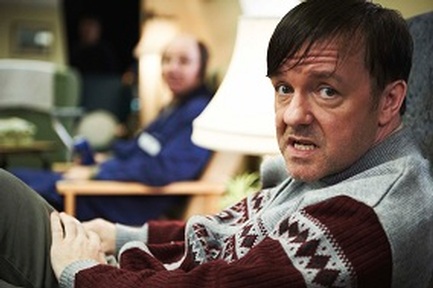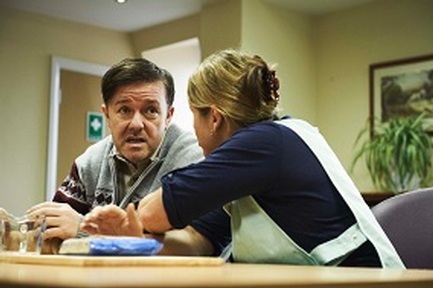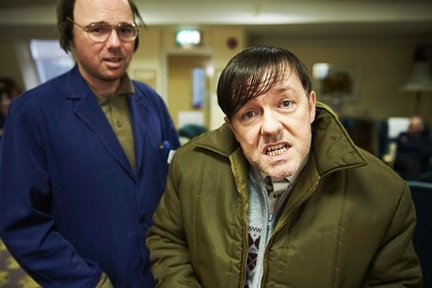'Brave, funny and touching' or 'vile, cynical and dishonest' - controversial care home sitcom Derek gets second series
When Ricky Gervais and Channel 4 announced that the pilot of Derek, his latest comedy venture set in a UK care home had been commissioned as a six part series, critics were quick to slam the show as callous and cruel for mocking someone who appears to have a learning disability.

The series opens the doors to a world which is often hidden from society, that of Broad Hill, a residential care home, and attracted 2.1m viewers in its first series which has led to Channel 4’s decision to commission a further six episode second series.
The pilot achieved Channel 4’s biggest viewing ratings for a scripted drama, after 2.3m people tuned in to learn about the lives of the dysfunctional ‘family’ within Broad Hill care home. This massive response from the public created a backlash of criticism as well as praise for Mr Gervais’s portrayal both of his character Derek, and the environment in which the show is set.
The series has sparked debate from people working in the care sector, keen to reflect on its interpretation and portrayal of the care home in the show.
Suzy Kennedy, development officer of online magazine Creative Support remarked: “Working in the social care sector, I was extremely eager to watch the programme myself and find out how Ricky had broached what many people perceive to be a sensitive topic.”
Arguments from families with disabilities and some disability charities claimed that his mannerisms openly mocked people with learning disabilities. Christopher Stevens, who has an autistic 15-year-old son, was quoted in the Mirror saying: “His performance in Derek was that of a schoolboy bully, showing off to his friends by pretending to be a ‘spazz’, combing his hair forward and sticking his lower jaw out.”
He labelled the show: “vile, cynical and dishonest”.
Dan Scorer, senior campaigns and policy manager at Mencap said: “Many people with a learning disability and their families have told Mencap that they think Gervais should step aside and allow people with a learning disability to play themselves, rather than carry on with his clumsy and offensive characterisation.
“Gervais maintains that Derek is not a disabled person, but is just different.”
Mr Gervais responded claiming that he never meant for Derek to be seen as having a disability and described how the care world is part of his daily life, saying “Half my family are care workers. My sister works with kids with learning difficulties. My sister-in-law works in a care home for people with Alzheimer's. And four or five of my nieces work in old people's homes. I always write about what I know.”

He instead claimed that Derek was a way to see the world through different eyes. Although not very bright, socially isolated and vulnerable, Derek is a character whose gentleness and kindness are his main traits which are not mocking of disabled people but celebratory of Derek’s simple kindness.
Mr Gervais described the nature of the show saying: “I love Derek more than any other character. In fact, I wish I were more like him. I wish everyone was.
“It's a show about kindness. It's funny and sweet and deals with the real issues of everyday life.
“The uncaring outside world popping in and out will boil your blood and the residents will break your heart.”
Shane Allen, Channel 4's head of comedy said: “Ricky is a leading voice in British comedy and through Derek he captures and reflects something of the spirit of modern society. A kind-hearted character in a world which TV normally shies away from, it feels like a perfect new direction for Ricky.”
Derek is not hidden away from society because of his problems; it is Derek’s truth and kindness which need protecting from society.
When Derek tries alcohol at his 50th birthday party, the scenes which follow of him being drunk and ill show the consequences often depicted in the media of binge drinking which, ironically is a behaviour more socially acceptable than ‘odd behaving’ Derek.
Daily Telegraph's TV reviewer, Chris Harvey commented on Gervais’s characterisation saying: “it simply didn’t come across as mocking. It was a way of looking at the world that was both joyful and touching.
"Gervais seems to have found a character that he relates to deeply. When Derek found a worm, tried to give it a drink in the pond in the garden of the nursing home, and wondered, in his child-like speech: “Is that its head? I give it both ends,”
It is through Derek that comments about the care sector can be made. His warm and honest straight forward character allows the viewers to see aspects of society’s approach to disabilities and care in another perspective that challenges the norm. When being approached by authorities about his possible autism Derek responds:
“Derek: “If I’m autistic would it change me? Would it kill me? Would it make me a different person?” Roger: “No.” Derek: “Then leave it.”
The sitcom uses sincerity as opposed to irony to allow dramatic moments time to develop. If care homes and vulnerable people have been hidden from society, the sitcom seems to reveal this world as more genuine and weighty than the other shows which claim to represent real life on TV.

Ms Kennedy of Creative Support said: “I felt that the show did a great job providing a realistic example of a residential care home. There is a real sense of community and cosiness in the communal area and it is obvious that the project is a home, not just a workplace or office.”
Mr Scorer, of Mencap commended the programme noting: “By addressing these issues in a sitcom, the programme will hopefully increase awareness amongst members of the public who otherwise might not hear about the impact of changes to social care on disabled and older people. “
The care home manager Hannah is another key character and she demonstrates the stretched resources and the dedication of care home staff which often goes unnoticed.
Hannah is clearly dedicated to her job and the home, determined to ignore the financial problems and pressures facing the home.
Actress Kerry Godlimen, who plays the home’s manager, said: “I'd like to be more like Hannah. It's nice to play her because she is so kind and non-judgemental.”
She championed the series, saying: “I think it could help audiences view older people differently and be more respectful towards them. I don't think we're very respectful towards the elderly at the moment. We're scared of old age. But people forget that old people were once young.”
The isolation of her character Hannah was captured throughout the series, and dramatic tension is created by some of Hannah’s frank and cutting remarks about or to the government ‘suits’ who audiences are set up to dislike in this drama.
In episode one, she comments on the council visit the home receives, saying: “I dread these council visits, it’s probably to introduce another bit of red tape to make my job even harder. They don’t care; they just have to make sure their costs come in on target.”
Although primarily entertaining audiences, the truth behind her comments in the series raises important issues and questions to viewers.
Ms Kennedy said: “The manager is clearly run off her feet, working plenty of overtime completing paperwork for audits, running an understaffed project (the majority of the staff are volunteers) and finding innovative methods to entertain residents and run a thorough service amidst continuing budget cuts.
“These are real life problems that social care staff must face every day and the show gives a very honest portrayal of these issues.”
The last episode of the current series of Derek is on Channel 4 on Wednesday 6 March at 10pm
Latest Features News
 25-Nov-19
2019 Election: Boris Johnson leaves social care in 'too difficult box' but Labour vows to end 'crisis'
25-Nov-19
2019 Election: Boris Johnson leaves social care in 'too difficult box' but Labour vows to end 'crisis'
 18-Oct-19
Podcast: Wendy Mitchell and dementia: 'My biggest fear is not knowing who my daughters are'
18-Oct-19
Podcast: Wendy Mitchell and dementia: 'My biggest fear is not knowing who my daughters are'
 27-Sep-19
Exclusive: Care minister backs care workers' call for time off to grieve and attend funerals
27-Sep-19
Exclusive: Care minister backs care workers' call for time off to grieve and attend funerals
 19-Sep-19
Podcast: Gyles Brandreth says poetry helps ward off dementia
19-Sep-19
Podcast: Gyles Brandreth says poetry helps ward off dementia
 30-Aug-19
Edinburgh Fringe funnyman joins comics facing toughest audience at care home gig
30-Aug-19
Edinburgh Fringe funnyman joins comics facing toughest audience at care home gig